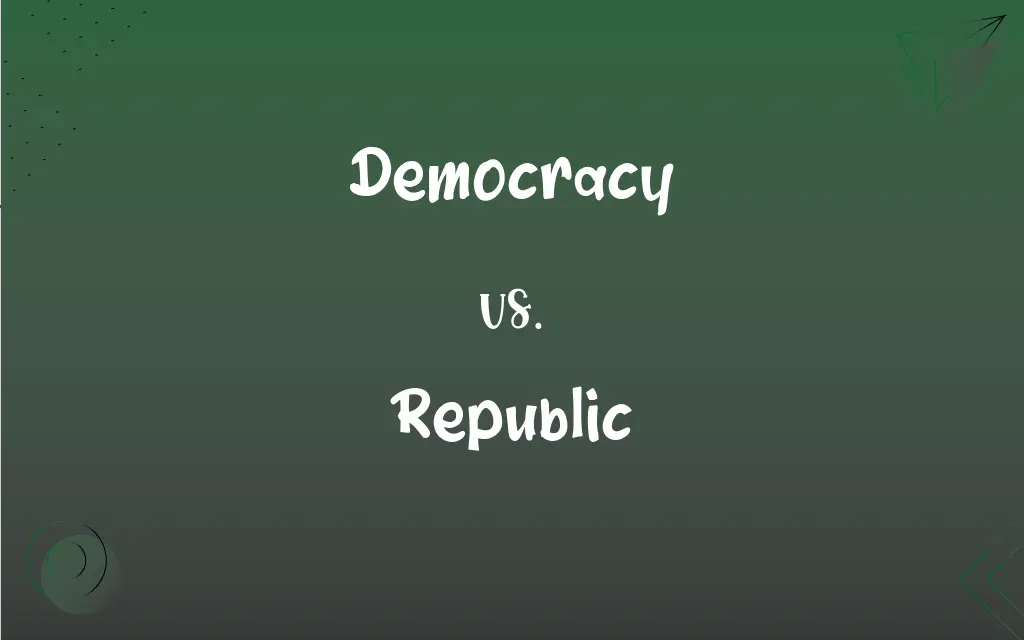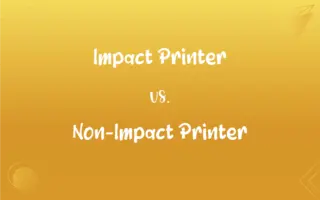Democracy vs. Republic: What's the Difference?
Edited by Aimie Carlson || By Harlon Moss || Updated on October 17, 2023
Democracy emphasizes the rule by the majority, while a republic centers on the rule of law and representation.

Key Differences
Democracy is a system where the majority rules directly or through elected officials. In contrast, a republic is characterized by a form of government in which elected representatives make decisions based on the rule of law.
In a pure democracy, the majority's decisions are final, often without any constitutional constraints. Meanwhile, in a republic, decisions made by representatives are checked by a constitution or a set of laws to protect minority rights.
Democracies value the voice and decision-making power of the majority. In republics, while majority decision-making still plays a significant role, there's a greater emphasis on safeguarding rights and ensuring that laws aren't merely subject to popular whims.
One can argue that most modern democracies are, in fact, democratic republics. They blend elements of pure democracy with features of a republic to strike a balance between the power of the majority and the rights of the minority.
It's crucial to understand that while many countries may identify as democracies or republics, the exact structures and nuances of their governments can vary widely based on cultural, historical, and legal differences.
ADVERTISEMENT
Comparison Chart
Definition
System where the majority rules directly or through officials.
System where representatives decide based on the rule of law.
Decision-making
By the majority.
By elected representatives.
Constraints
Fewer, based on majority rule.
Constitutional or legal constraints to protect minority.
Focus
Power of the majority.
Balance between majority power and minority rights.
Examples
Ancient Athens.
The United States of America.
ADVERTISEMENT
Democracy and Republic Definitions
Democracy
A system where citizens have a direct say in decision-making.
Ancient Athens practiced a form of direct democracy where citizens voted on laws.
Republic
A system prioritizing the rule of law over majority rule.
In a republic, laws are crafted and upheld to ensure minority rights are protected.
Democracy
A system where governance is based on the collective will.
Democracy believes in the principle that the majority's voice should guide the governance.
Republic
A government where the head of state is not a monarch.
France, being a republic, doesn't have a king or queen but a president.
Democracy
A governance method emphasizing majority rule.
In a democracy, if the majority votes for a particular law, it gets implemented.
Republic
A political entity emphasizing representation and constitutionality.
The essence of a republic is having representatives make decisions under a constitution.
Democracy
A form of government where power is vested in the people.
The essence of democracy is the belief that power originates from the citizenry.
Republic
A state in which the supreme power rests in the body of citizens entitled to vote and is exercised by representatives chosen by them.
The United States is a republic where citizens elect their leaders.
Democracy
A political system allowing people to choose their leaders.
Through the process of elections, democracy ensures that people's voices are heard.
Republic
A state where governance is based on elected representation and laws.
In a republic, citizens choose individuals to represent their interests and uphold the law.
Democracy
Government by the people, exercised either directly or through elected representatives.
Republic
A political order whose head of state is not a monarch and in modern times is usually a president.
Democracy
A political or social unit that has such a government.
Republic
A nation that has such a political order.
FAQs
How is a republic different?
A republic emphasizes elected representation and the rule of law, often with a constitution protecting minority rights against majority rule.
Which system, democracy or republic, is more widespread?
Many modern nations blend elements of both, often identifying as democratic republics.
Can a country be both a democracy and a republic?
Yes, many countries, like the USA, are democratic republics, blending elements of both systems.
Is direct participation higher in democracy?
Generally, yes. In pure democracies, citizens have a more direct role, whereas republics emphasize representative participation.
Why do some countries prefer to identify as a republic?
The term emphasizes representation, the rule of law, and often a commitment to certain principles or a constitution.
Are there pure democracies in the modern world?
Elements of direct democracy exist.
Why is majority rule emphasized in democracy?
Democracy values the collective will and decision-making power of the majority.
Can a monarchy be a republic?
No, a republic is specifically a system where the head of state is not a monarch.
Which system, democracy or republic, offers more protection to minorities?
Republics, with their emphasis on the rule of law, often provide more safeguards for minority rights against unchecked majority rule.
Are republics free from corruption?
No system is immune to corruption; the efficacy of a republic depends on its institutions and enforcement of the rule of law.
Does democracy always result in the best decision?
Democracy reflects the will of the majority, which might not always be the optimal decision for everyone or long-term interests.
What is democracy?
Democracy is a system where citizens have a say in governance, typically through voting, either directly or through elected representatives.
In a republic, who makes decisions?
Elected representatives make decisions, often within the framework of established laws or a constitution.
Does democracy ensure individual rights?
While it values majority rule, individual rights might not be as safeguarded as in republics with strong legal frameworks.
Which system, democracy or republic, is older?
Forms of democracy date back to ancient times, like in Athens, while the concept of republics became prominent later.
Can the terms democracy and republic be used interchangeably?
While they have distinct definitions, in modern contexts, especially in nations that blend both elements, they are sometimes used interchangeably.
Can a dictatorship emerge from a democracy?
Yes, if the majority consistently supports a single leader or party without checks and balances, it's possible.
How do republics ensure representation?
Through elections, where citizens vote for individuals to represent their interests and uphold the rule of law.
Does a republic always have a constitution?
While many do, the key feature is the rule of law, not necessarily a written constitution.
Are all democracies direct democracies?
No, many are representative democracies, where citizens elect officials to make decisions on their behalf.
About Author
Written by
Harlon MossHarlon is a seasoned quality moderator and accomplished content writer for Difference Wiki. An alumnus of the prestigious University of California, he earned his degree in Computer Science. Leveraging his academic background, Harlon brings a meticulous and informed perspective to his work, ensuring content accuracy and excellence.
Edited by
Aimie CarlsonAimie Carlson, holding a master's degree in English literature, is a fervent English language enthusiast. She lends her writing talents to Difference Wiki, a prominent website that specializes in comparisons, offering readers insightful analyses that both captivate and inform.































































